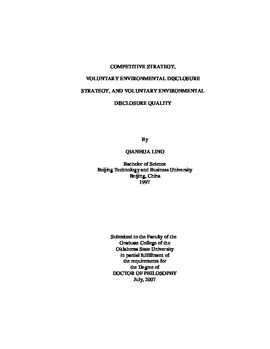| dc.contributor.advisor | Mowen, Maryanne | |
| dc.contributor.author | Ling, Qianhua | |
| dc.date.accessioned | 2013-11-26T08:31:16Z | |
| dc.date.available | 2013-11-26T08:31:16Z | |
| dc.date.issued | 2007-07 | |
| dc.identifier.uri | https://hdl.handle.net/11244/7140 | |
| dc.description.abstract | Scope and Method of Study: Concerns exist that companies make voluntary environmental disclosures (VED) primarily to enhance their public image. In response to the concerns, this study examines whether a company's competitive strategy is an important factor in the VED decision, and also in the quality of VED. This study focuses on a highly polluting industry, the chemical industry, and adopts various measurement methods and econometric specifications for the examination. | |
| dc.description.abstract | Findings and Conclusions: Using VED about 2004 environmental performance, this study finds that companies emphasizing investment in brand image are likely to voluntarily provide more environmental information than companies that do not emphasize this strategy. Companies emphasizing investment in R&D are likely to make more voluntary disclosures about actual environmental performance than companies that do not emphasize the strategy. | |
| dc.description.abstract | This study also finds that company competitive strategies affect the association between VED and environmental performance differently. If the environmental performance measure has implications for sustainability, the association between VED and environmental performance is the same or more negative for companies emphasizing investment in brand image relative to other companies. If the environmental performance measure has implications for environmental liabilities, the association between VED and environmental performance is adjusted, so these companies' VED are less likely to relate to poor environmental performance. For companies emphasizing investment in R&D, the tendency of VED to be linked to poor environmental performance is ameliorated. The association between VED and environmental performance is stronger for R&D companies compared to other companies. This association is also stronger if the environmental performance measure has implications for sustainability than if the environmental performance measure has implications for environmental liabilities. | |
| dc.format | application/pdf | |
| dc.language | en_US | |
| dc.rights | Copyright is held by the author who has granted the Oklahoma State University Library the non-exclusive right to share this material in its institutional repository. Contact Digital Library Services at lib-dls@okstate.edu or 405-744-9161 for the permission policy on the use, reproduction or distribution of this material. | |
| dc.title | Competitive strategy, voluntary environmental disclosure strategy, and voluntary environmental disclosure quality | |
| dc.contributor.committeeMember | Meek, Gary | |
| dc.contributor.committeeMember | Nabar, Sandeep | |
| dc.contributor.committeeMember | Rao, Ramesh P. | |
| osu.filename | School of Accounting_07.pdf | |
| osu.accesstype | Open Access | |
| dc.type.genre | Dissertation | |
| dc.type.material | Text | |
| dc.subject.keywords | competitive strategy | |
| dc.subject.keywords | voluntary environmental disclosure | |
| dc.subject.keywords | disclosure quality | |
| dc.subject.keywords | chemical industry | |
| dc.subject.keywords | voluntary disclo | |
| thesis.degree.discipline | Accounting | |
| thesis.degree.grantor | Oklahoma State University | |
